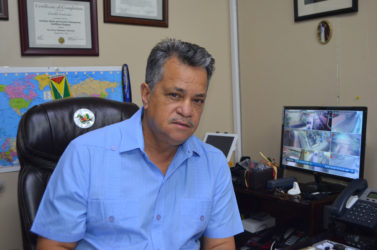The present standoff between the APNU+AFC Coalition Government and the Private Sector Commission (PSC) following a sharp public exchange between the two earlier this month is “a counterproductive development that is unacceptable given the uncertainty of the present economic climate,” former PSC Chairman and Roraima Airways Chief Executive Officer Gerry Gouveia told Stabroek Business in an interview on Tuesday.
“At a time when all the countries surrounding us – Trinidad, Suriname, Barbados, Venezuela and Brazil – are in economic trouble and when there might be persons and organizations bleeding our foreign exchange into those troubled countries, more than ever before, we need to put our heads together to craft a strategy to protect our exchange rate. Instead, we are hardly even talking to each other. Frankly, I find the whole thing ridiculous,” an animated Gouveia said.
“Given everything that is happening there is every reason for the government and the private sector to be talking to each other. The economic challenges facing us are not going to be solved by one side or the other. It has to be done together. Instead of dialogue what obtains are harsh words and threats. It’s nonsense really,” the business executive added.

Early in December the PSC mounted a sharp attack on the government’s 2017 budget with the Chair of the Commission’s Finance and Economic sub-committee Ramesh Persaud declaring that the budget had left the private sector still not very clear on the overall direction in which the country is heading. “We don’t have certainty of plans,” Persaud had told a post-budget press conference. Since then the PSC has become increasingly critical of the country’s economic direction.
A subsequent sharp exchange between the two sides that ended with the government charging that the PSC’s statement was “political,” widened the rift between the two sides, and threw up a wall of silence that has remained in place since then.
Asked whether he thought that the country’s economic circumstances dictated that the two sides should engage, Gouveia responded that it would be, “illogical for them to do otherwise.” The former PSC Head said that the rift between the two sides “only serves to deepen the wider uncertainty with regard to the state of the country’s economy. It would be irresponsible on both sides not to want to meet. We’ve got to begin to trust each other, listen to each other’s positions on the issues that matter and arrive at decisions to move this economy forward.”
According to Gouveia it was inconceivable, “that we could have a situation in which the government and the private sector were not talking when it requires a collective effort by them both to fix the country’s economy. Frankly, it’s immature and it’s embarrassing. We should not have to be using the media to beg the government and the private sector to sit down together. It is a question of having a sense of duty, a commitment to doing what’s best for Guyana.”
Gouveia said he believed the dismantling of the Competitive Council which was chaired by the President, was “a bad move” by the government.
He stated that the Competitiveness Strategy which had been funded by the Inter-American Development Bank had functioned as “a structured forum for interaction between private sector and government, at the highest levels. Dismantling this forum effectively closed off a mechanism that enabled structured dialogue between government and the private sector where the President himself chaired the Council.”
And insofar as the ongoing coldness between the public and private sectors are concerned Gouveia observed, “The nation can only hope that both sides will, agree, and quickly, to sit together, though I worry that we may well have grown too accustomed to gridlock as part of our socio-political process.”
Meanwhile, he said he was becoming concerned over what he described as “official threats” and “sound bites” by government which he said could both intimidate the private sector and impact on investor confidence.
He said he believed the discussion by Finance Minister Winston Jordan and Central Bank Governor Dr Gobin Ganga regarding the closure of the foreign currency retention accounts of local companies, in the wake of central bank suggestions of the hoarding of currency can easily be perceived as a threat and could well be “unhealthy” for the public/private sector relationship.
“I can tell you that pronouncements like that are likely to scare the private sector and could make it even more unlikely that the two sides will sit down in good faith together. Threats like that are bad for the relationship,” Gouveia concluded.





